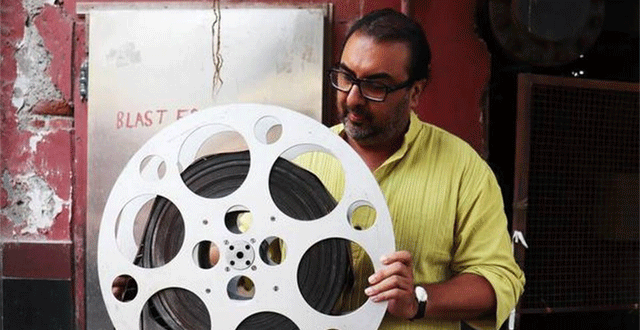
TO RESTORE AND PRESERVE THE CLASSICS
Sangeetha Devi Dundoo 08/19/2019Film Heritage Foundation and Martin Scorsese’s The Film Foundation to conduct the fifth Film Preservation and Restoration Workshop India in Hyderabad
Imagine being able to watch Telugu classics such as Pathala Bhairavi, Devadasu or Sankarabharanam on digital streaming platforms, in high quality. This is possible only if the original (film negatives in the case of old films) have been preserved well.
However, anyone who has had the chance to visit a film lab will disclose how the old negatives and prints lie in neglect. But, what if there’s a chance to train film enthusiasts to restore and preserve archival material?
This December, the Film Heritage Foundation (FHF) and the International Federation of Film Archives (FIAF) will be conducting ‘Saving India’s Cinema Heritage’, the fifth Film Preservation and Restoration Workshop India, in Hyderabad, at Annapurna Studios, in partnership with Viacom18.
The week-long workshop will have hands-on training sessions in film and photography preservation and restoration, conducted by experts from around the world. The workshop will be held with the support of Martin Scorsese’s The Film Foundation (TFF) and is open to anyone keen to learn to preserve film and allied materials. The application will up on filmheritagefoundation.co.in from August 25. FHF will be announcing this workshop through an event in Hyderabad, in the presence of actor Nagarjuna and director K Viswanath, among other dignitaries, on August 20.
The beginning
While making the film Celluloid Man (on film archivist PK Nair), Shivendra discovered the magnitude of the loss of Indian film heritage. Film Heritage Foundation (FHF) was formed in 2014, to help archive old and new films. Amitabh Bachchan came on board as the foundation’s brand ambassador. Members of the advisory board include Jaya Bachchan, Shyam Benegal, Gulzar, Kamal Haasan, Kumar Shahani and Girish Kasaravalli. Martin Scorsese’s ‘The Film Foundation’ began supporting restoration workshops of FHF since 2015.
Says Shivendra, “When we started FHF in 2014, saving India’s film heritage was an obscure cause with most people asking us ‘what is film heritage?’ and ‘do films really need to be preserved?’ We began with a focus to preserve what remained of our film heritage and to create awareness among the film fraternity about the urgency of the situation as well as change attitudes in India that treated films as commerce, and not as art.”
Film handling and preparation | Photo Credit: By arrangement
What FHF does
Since 2015, FHF has conducted four workshops on film preservation and restoration (in Mumbai, Pune, Chennai and Kolkata) and published two books on film preservation and restoration the subject and also reached out to different film industries in India to urge the importance of preservation.
The FHF has a collection of nearly 300 films on 35 mm, 16 mm and 8 mm formats, preserved in a temperature-controlled storage facility. “We maintain the films of leading film personalities like Amitabh Bachchan, Shyam Benegal, N N Sippy, Mani Ratnam, Vishal Bhardwaj, Kumar Shahani, Farhan and Zoya Akhtar, Govind Nihalani, Chitra Palekar, Onir, Shaad Ali, Sumitra Bhave and Sunil Sukthankar,” reveals Shivendra. The films are periodically checked, cleaned and repaired.
Shivendra hopes to build a world-class centre for the moving image which will incorporate a conservation centre, a library, training and research facilities, a museum, exhibition spaces and screening rooms.
Telugu classics FHF hopes to restore
- Malapilla (1938), Raithu Bidda (1939), Sumangali (1940), Swarga Seema (1945), Pathala Bhairavi (1951), Malliswari (1951), Devadasu (1953), Rojulu Marayi (1955), Missamma (1955), Mayabazar (1957), Dr Chakravarty (1963), Nartanasala (1963), and Sankarabharanam (1979).
The Hyderabad focus
In summer 2019, Shivendra did a recce in Hyderabad. Shivendra is aware of the work done by pioneers such as Raghupati Venkaiah Naidu, H M Reddy, B N Reddy, Akkineni Nageswara Rao, L V Prasad, D Ramanaidu, Ramoji Rao and N T Rama Rao, among others. He met the core team of Annapurna Studios and Ramanaidu Studios, apart from veteran directors who showed an interest in restoring old films.
Shivendra recalls an incident from 2014 that made him realise the dearth of film preservation in Telugu cinema, “George Eastman Museum in Rochester, NY, requested my help to acquire a 35 mm print of Magadheera (2009) for archival purposes. I got in touch with S S Rajamouli and Allu Aravind, but we were not able to locate a Telugu print and finally had to ship a dubbed Tamil version to the museum. This got me thinking about the state of preservation of Telugu films. If we could not find a 35 mm original Telugu language print of a blockbuster like Magadheera, what could be the fate of the earlier classics?”
Shivendra observes that like the other film industries in India, Telugu cinema also has a poor record of film preservation, “Original camera negatives have either disappeared or are in terrible condition due to poor storage; the same applies to the prints.”
He asserts that it’s important to preserve the original camera negative since even in the digital age, one needs to go back to the original celluloid source to get scans of the best resolution and quality. “Many people discarded the original celluloid material after scanning it at 2K not realising that if they need digital copies of a higher resolution, they will need to go back to the original celluloid. Celluloid is still considered the best archival medium with a proven longevity of over a 100 years,” he explains.
What to expect?
From the previous film restoration and preservation workshop | Photo Credit: By arrangement
The intensive week-long workshop to be conducted in Hyderabad, certified by FIAF, will cover both lectures and practical classes in the preservation and restoration of both films and film-related paper and photographic material. Participants can opt for one of four streams of specialisation — film, digital, cataloguing, photo and paper conservation.
The past workshops have helped to train and build a resource of local film preservers. A faculty of expert trainers from institutions like the British Film Institute, Imperial War Museums, Cinematheque Francaise, Academy of Motion Picture, Arts & Sciences, George Eastman Museum, Cineteca di Bologna, L’Immagine Ritrovata, Austrian Film Museum, EYE Filmmuseum, Museum of Modern Art, Bundesarchiv, ARRI, Indiana University Library of Moving Images Archive, the Criterion Collection, conduct the sessions. Classes are followed by daily screenings of restored films.
In 2017, Tata Trusts came on board with a grant that has enabled a majority of the participants to do the course free of cost since then.
Apart from creating awareness about preserving film heritage, the workshops have promoted the idea of film preservation as a viable career opportunity, says Shivendra.
(For details, check www.filmheritagefoundation.co.in)
The Hindu